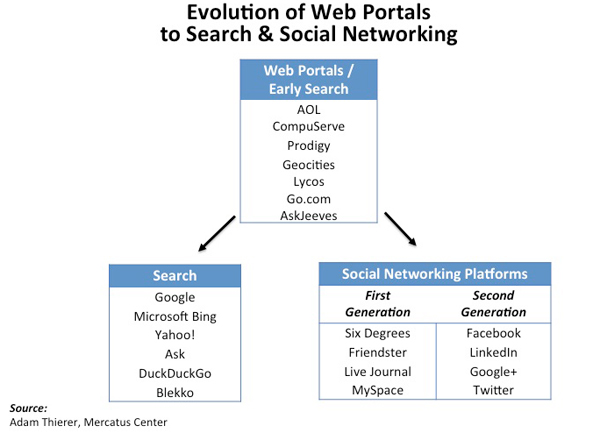- | Technology and Innovation Technology and Innovation
- | Working Papers Working Papers
- |
The Perils of Classifying Social Media Platforms as Public Utilities
The problems long associated with regulating public utilities could occur with social networks in the absence of competitive pressure.
This article was published in the Journal of Communications Law and Technology Policy.
Summary
Are social networking sites like Facebook, LinkedIn, and Twitter “information monopolies” that should be regulated as public utilities? While calls for social networking regulation are on the rise, there are good reasons why policymaker should avoid the rush and rethink classifying them as “public utilities.” Public utility regulation has traditionally been the arch-enemy of innovation, and this could have lasting effects on such a dynamic industry. Treating today’s leading social media providers as essential facilities threatens to convert predictions of “natural monopoly” into a self-fulfilling prophecy.
Proponents of social media regulation use varying rationales, ranging from traditional economic concerns to more amorphous social and cultural issues. Critics claim that utility-like regulation may be necessary not so much to satisfy economic or equity rationales, but to achieve various social policy objectives, such as protection of user privacy. Others, like Tim Wu of Columbia Law School Page, argue that “information monopolies,” including Google, Apple, and Twitter, are on the rise and need regulation.
Social media aren’t public utilities for two key reasons:
- Social Media do not possess the potential to become natural monopolies. They are virtually no costs to consumers and competitors have the ability to duplicate such platforms. The hottest networks are changing every year, and there is no way for the government to determine which platform is going to become popular next. Remember MySpace or CompuServe?
- Social Media are not essential facilities. Those who claim that Facebook is a “social utility” or “social commons” must admit that such sites are not essential to survival, economic success, or online life. Unlike water and electricity, life can go on without social networking services.
Public utility regulation would instead stifle digital innovation and raise prices of these services for users. Not only are social media sites largely free and universally available, but they are also constantly innovating. Because social media are fundamentally tied up with the production and dissemination of speech and expression, First Amendment values are at stake, warranting heightened constitutional scrutiny of regulatory proposals. The problems long associated with regulating public utilities could occur with social networks in the absence of competitive pressure.


